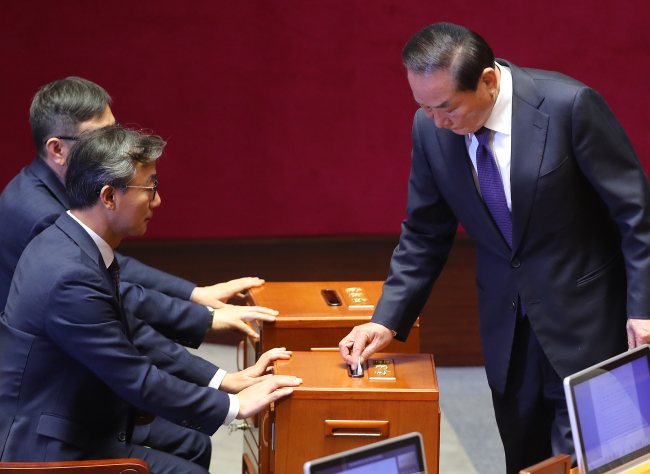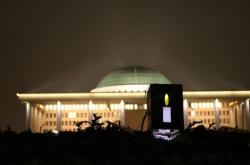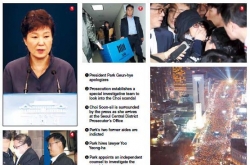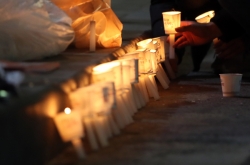Despite the lingering last minute uncertainties over the fate of President Park Geun-hye, the National Assembly on Friday passed the impeachment bill in a landslide vote of 234 to 56.
The sweeping approval, which immediately suspended the embattled president from office, was taken as an undeniable signal of the fall of one particular political force -- President Park’s loyalists who dominate the leadership of the ruling Saenuri Party.
Some Saenuri reformists even claimed that the conservative party has no other choice but to disband itself and form a new entity that represents revamped conservatives after the demise of Park.
 |
Rep. Suh Chung-won (right) of the Saenuri Party participates in Friday`s impeachment vote on President Park Geun-hye at the National Assembly. (Yonhap) |
Among the 300 legislative members, 299 participated in the plenary session to participate in the impeachment bill vote. Of them, 234 voted in consent, while 56 objected, two abstained and seven were counted as invalid.
The prime focus prior to the floor vote was whether or not the number of consenting ballots from the Saenuri will make it past 28, the minimum needed for the opposition to attain the quorum to have the bill passed.
But the 234 consents indicated -- on the premise that all 172 opposition and independent lawmakers voted in favor as pledged -- that a total of 62 Saenuri figures advocated impeachment.
This not only exceeded the 35-40 mark which Saenuri rebels had earlier claimed but also constituted a near majority in the 128-seat ruling party.
“If the (consenting) votes exceed 220, it will mean that a considerable amount of pro-Park members decided to stand with us, which will fundamentally change the political map hereafter,” Rep. Lee Choon-suak of the main opposition Democratic Party of Korea said in a radio interview earlier in the day.
The parliamentary floor‘s 78 percent approval for impeachment largely came in line with the recent set of public polls.
According to a survey conducted by local pollster Gallup Korea in the week running up to Friday’s vote, Park’s approval rating stood at 5 percent, with 81 percent of the respondents giving a negative assessment on her state affairs capacity.
The voting result also meant that a significant number from those classified as pro-Park secretly casted their ballot in favor of driving out the president.
In particular, it was the junior first- and second-termers who are rumored to have broken from the leadership’s leverage and casted a secret vote in favor of impeachment.
Most of them, owing their April general election candidacy to the pro-Park leadership, have so far refrained from clarifying their stance over the bill, but have alluded some discontent over the disgraced president.
The secret vote system, once considered a loophole which may let undecided figures slip away from the impeaching group, thus turned out to have acted in favor of the bill, allowing reserved pro-Parks to express their disapproval.
As if aware of the growing sense of division, the pro-president group had urgently called for the rejection of the impeachment bill, especially during the last few days before voting.
“We must at all costs prevent impeachment, which will not be the end of confusion but only the start of greater chaos,” said Rep. Choi Kyung-hwan at an urgent party meeting which was allegedly summoned by the pro-Park cluster.
Choi, along with party chairman Rep. Lee Jung-hyun and eighth-termer Rep. Suh Chung-won, is deemed a leading Park loyalist. He was also the only one who did not appear in the session, thus making it clear not to vote for impeachment.
Despite all these desperate efforts to rescue the embattled president from forceful ouster -- and thus to safeguard their own political career -- the pro-Park group failed to hold its members together.
“It is only right that floor leader Rep. Chung Jin-suk and I should take responsibility and step down,” Chairman Lee said in a press conference following the voting result announcement.
“I am ready to resign as soon as a minimum level of measures are made to prevent a power vacuum within the party.”
What now lies ahead for political parties is an earlier-than-expected presidential election next year, which is likely to take place between April and June.
All political parties are to readjust their political clock to have their presidential candidates selected in time and gear up for campaigning.
Another key issue is the Constitution of an interim power which will take over the suspended president’s authority until the Constitutional Court‘s impeachment decision.
While incumbent Prime Minister Hwang Kyo-ahn has come in charge, opposition camps have been denouncing his role, citing his close political affiliation with the president.
By Bae Hyun-jung
(
tellme@heraldcorp.com)


![[From the scene] How the impeachment day unfolded](http://res.heraldm.com/phpwas/restmb_idxmake.php?idx=605&simg=/content/image/2016/12/09/20161209001032_0.jpg)












![[Today’s K-pop] Blackpink’s Jennie, Lisa invited to Coachella as solo acts](http://res.heraldm.com/phpwas/restmb_idxmake.php?idx=644&simg=/content/image/2024/11/21/20241121050099_0.jpg)